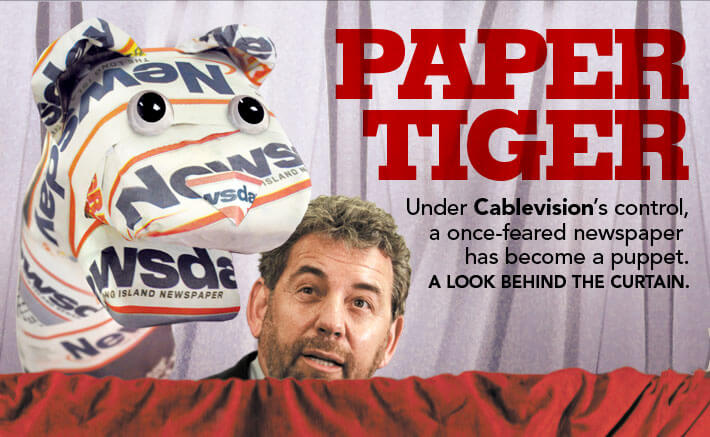
PAY NO ATTENTION TO THAT MAN BEHIND THE CURTAIN
John Mancini, the Debbies’ predecessor, is a fast-talking, quick-witted editor in chief from Queens. He also had his detractors—some thought he took the paper too far into the trashier territory of the New York Post, which is understandable since he had worked there after leaving the defunct New York Newsday in 1995, where he learned the esoteric ways of running the “tabloid in the tutu” under the guidance of Don Forst, a legendary no-holds-barred newspaperman. Mancini, who later returned to Newsday and became editor in chief in 2004, always had a more “in your face” city mentality that sometimes didn’t mesh well with the suburban sensibility of Newsday tradition.
But the writing was on the wall when he disappeared from the Melville office for five days in January 2009, following a “difference of opinion”—as Mancini later described it—with Cablevision’s owners, James Dolan in particular. The offense was Mancini’s decision to play up a story about a sexual harassment claim against Knicks player Eddy Curry filed by his male driver. The Post reported that then-publisher Tim Knight, left over from the days when the Chicago-based Tribune Co. owned Newsday, worked “behind the scenes to convince the Dolans to allow Mancini to return.”
“No one knew where he was,” said a staffer. “Was he working here or not?” The answer came on Inauguration Day, 2009, when Mancini re-entered the newsroom to a hero’s welcome. People crowded around him, applauding his journalistic independence, and asking him what had happened. He grinned and shrugged it off. “Everything’s fine!” he said.
Not so, apparently. His dust-up with the Dolans “sent a chill down everyone’s spine,” said a staffer. And it only got colder. Come that December, the Post reported: “For the second time in less than a year, John Mancini is out as editor-in-chief of Newsday—and this time it is going to stick.”
Debby Krenek, let go as editor of the New York Daily News in 2000, took Mancini’s place at Newsday in 2009, and within three weeks Debbie Henley, who had left the paper to go back to Virginia and teach, became Newsday’s managing editor. By all accounts, the two Debbies are no slouches, regularly spending 11 to 12 hour days at the office.
As a staffer said, “They seem to be of the mindset that if they just work hard enough they can do everything.”
Even captions fall under the scrutiny of the editor in chief, reporters say, adding that no story moves to the copy desk without Henley or Rosen reading it first, which might save the paper from embarrassment but certainly won’t save time. It also hasn’t been winning them many fans.
“You rewrite the stories and micromanage everything when you don’t trust your people,” says a staffer. “It’s as simple as that.”
Asked why these top editors—the inhabitants of “The Glass Offices” as they’re dubbed—would err on the side of caution, the former staffer, quoted above, said, “I don’t know why The Glass Offices are so paralyzed but it might have something to do with Mancini getting fired over his handling of the Knicks coverage.”
There was no consensus among current staffers whom the Press contacted about the extent of Cablevision’s editorial influence. Some said they never felt it, even if their stories might have direct bearing on the cable company’s corporate interests.
“We don’t know whether James Dolan has even thought of us for more than five seconds a day,” says a staffer. “Does he give a shit whether we devote our front page to crime or town news? We have no idea why these people are making the decisions they’re making.”
Some critics, however, do give credit where they say credit is due.
“I think they do a better job today of covering the local stuff than they did six or seven years ago,” says an ex-staffer who asked not to be identified because of a continuing business relationship with the paper. “But I don’t see the young people working there really digging to get some of these stories. My impression is that a lot of it comes from press conferences and news releases. One of the comments made on the Debbie CowardlyLion site is that Newsday’s become a PR man’s dream machine, and in some respects, I think she’s right.”
A representative sampling of politically connected Long Island insiders and public relations people familiar with Newsday’s evolution over time, who were interviewed for this story but who also requested anonymity, agree.
In its defense, the paper’s hyper-local emphasis, aka the “super loco local,” draws some raves, even from reporters who suddenly found themselves with a brand new beat. Thanks to the advance notice of public hearings hundreds of people would actually show up, instead of just a handful.
“The reader feedback has been very positive,” a reporter told the Press. But the job switch may have unnecessarily been abrupt—the announcement that town coverage would be doubled was tucked into the end of a presentation officially billed as a promotion of Newsday’s upcoming new TV commercials, so many veterans blew it off, not realizing their assignments were about to change permanently.
“A few years ago, the paper was awful,” says another former staffer. “It was disjointed, it just seemed that it had no direction, it didn’t know what it wanted to be.… Now, they’ve refocused themselves, and I think they’re a much better paper than they were a few years ago.”
Lawrence C. Levy, a former Newsday columnist, reporter and editorial writer who is now the executive director at Hofstra University’s National Center for Suburban Studies, approves of the paper’s current content configuration.
“Considering the limited financial resources, which are a problem everywhere,” Levy says, “I think they’ve come up with a pretty decent formula for delivering more local information without totally ignoring the rest of the world.”



























